【2022中考英语一轮教材专题复习】外研八年级下册 Modules 6-8课件(共84张PPT)
文档属性
| 名称 | 【2022中考英语一轮教材专题复习】外研八年级下册 Modules 6-8课件(共84张PPT) | 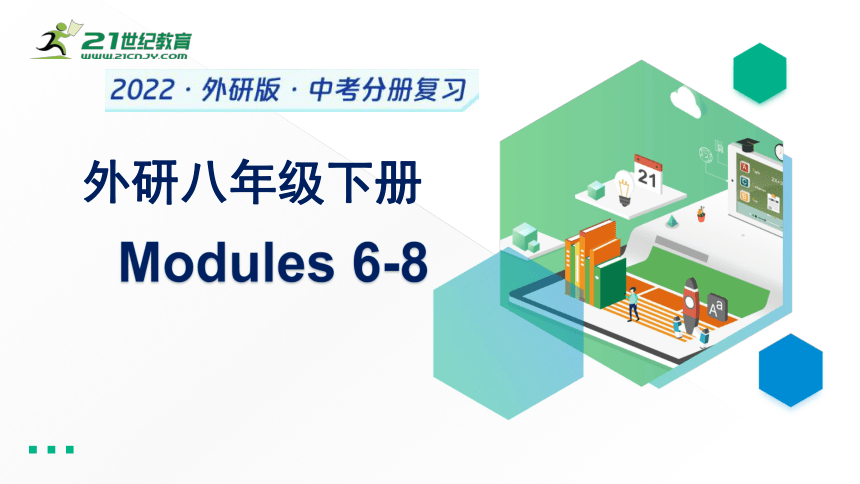 | |
| 格式 | pptx | ||
| 文件大小 | 3.3MB | ||
| 资源类型 | 试卷 | ||
| 版本资源 | 外研版 | ||
| 科目 | 英语 | ||
| 更新时间 | 2022-02-12 11:40:48 | ||
图片预览

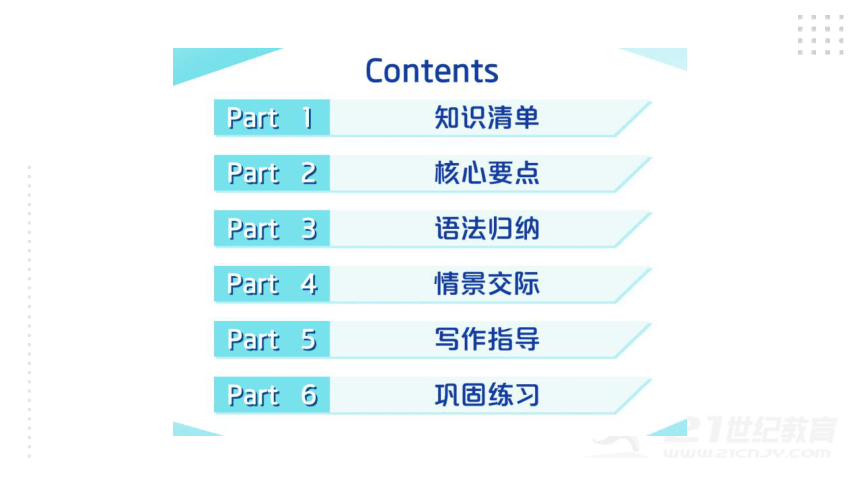
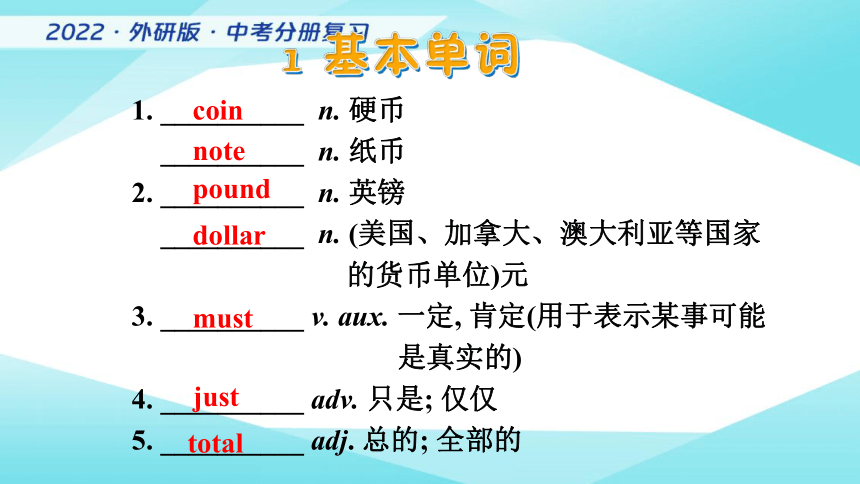
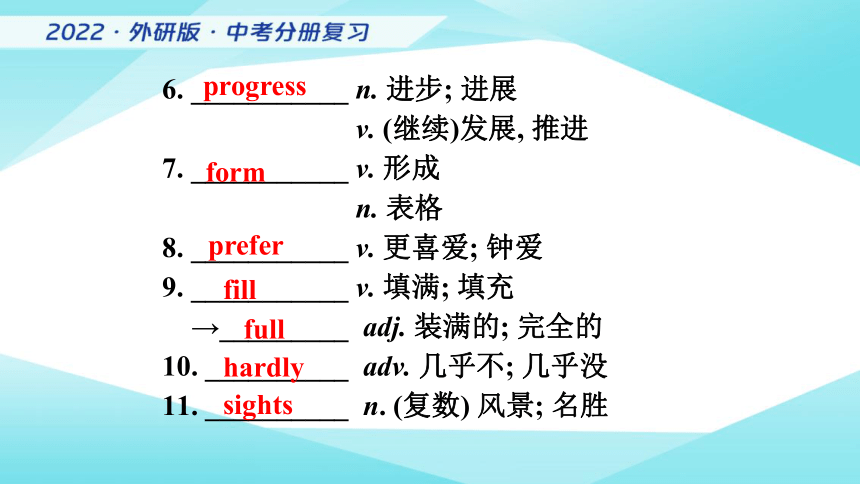
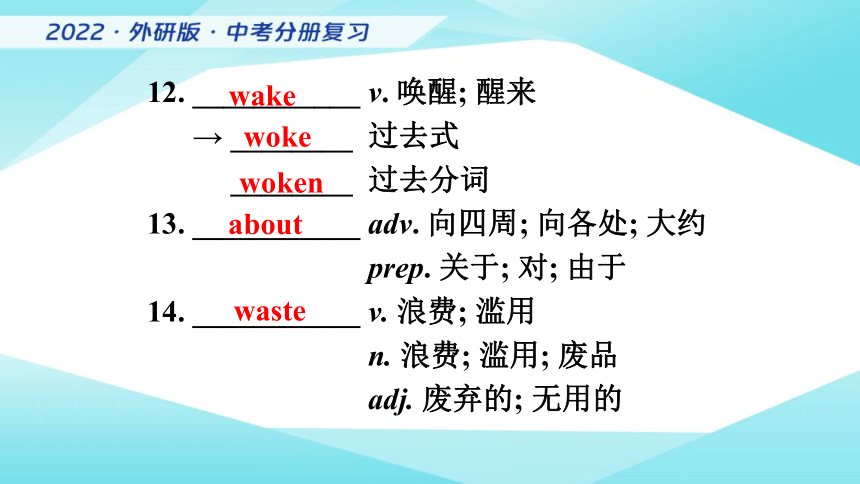
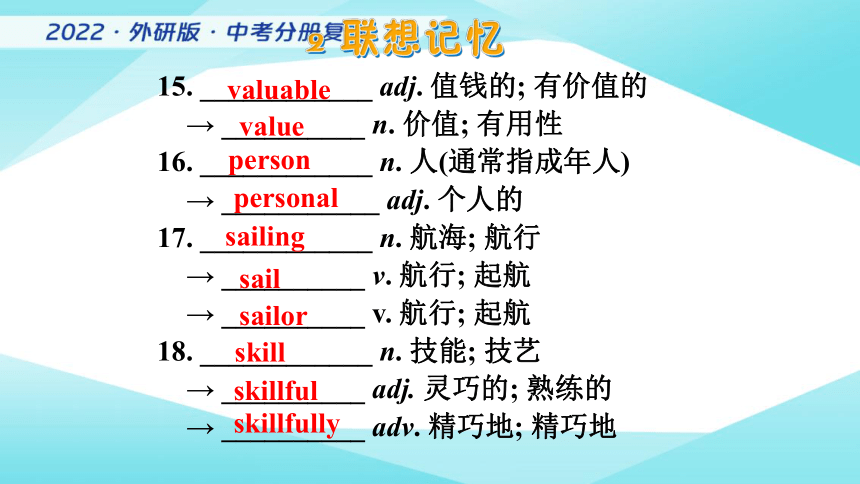
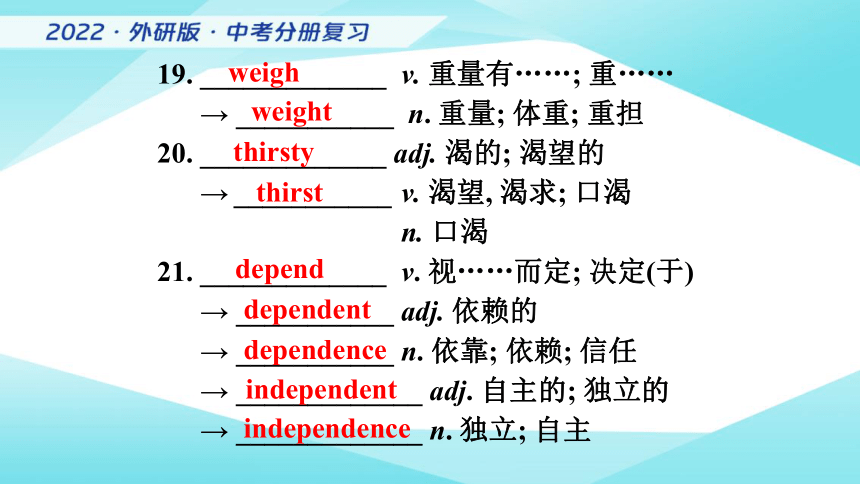
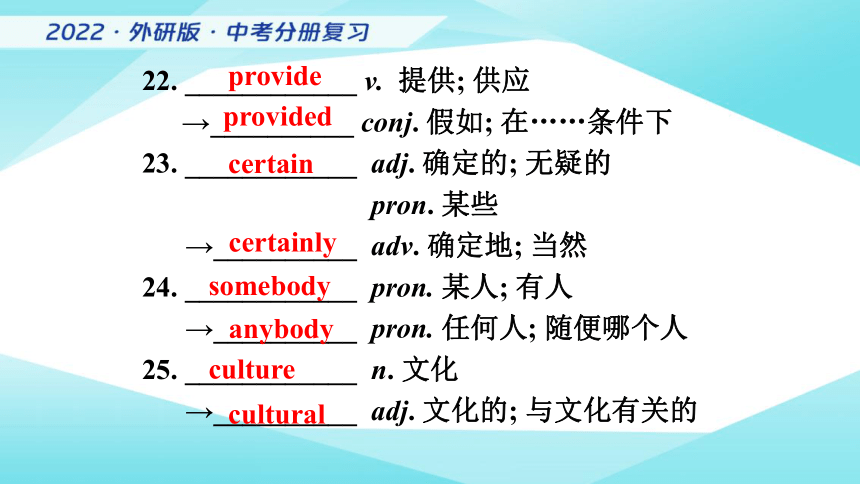
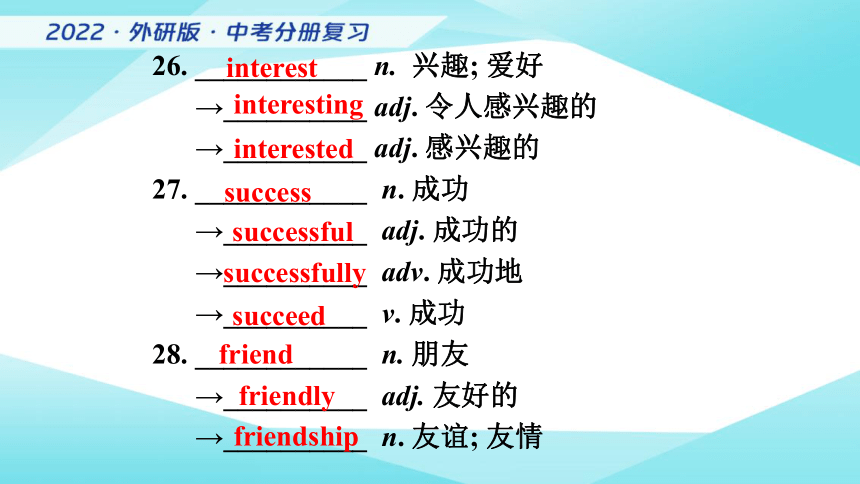
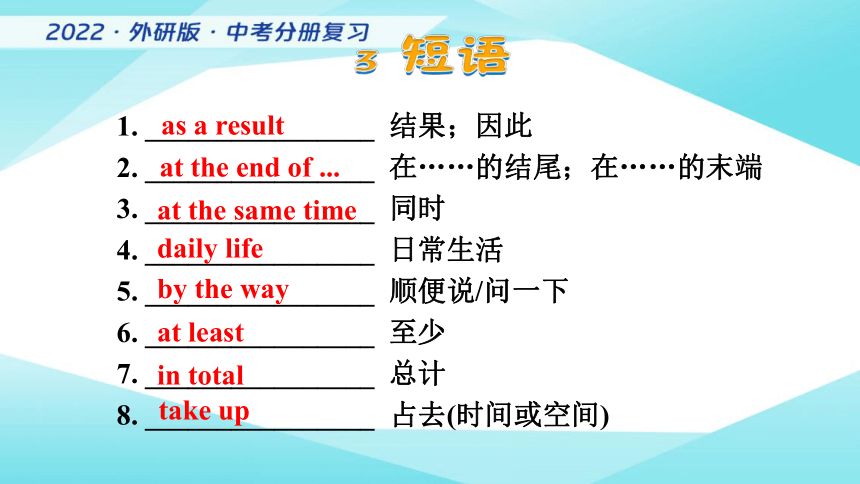
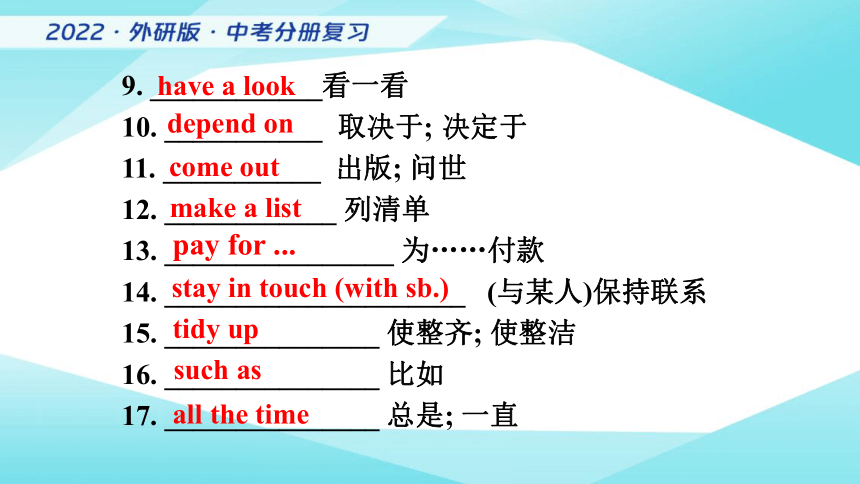
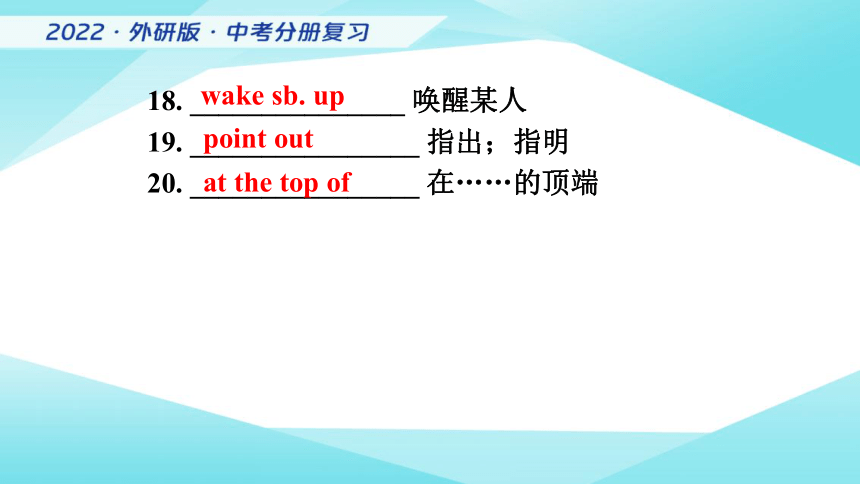
文档简介
(共84张PPT)
外研八年级下册
Modules 6-8
Presentation
1. __________ n. 硬币
__________ n. 纸币
2. __________ n. 英镑
__________ n. (美国、加拿大、澳大利亚等国家的货币单位)元
3. __________ v. aux. 一定, 肯定(用于表示某事可能是真实的)
4. __________ adv. 只是; 仅仅
5. __________ adj. 总的; 全部的
coin
pound
must
note
dollar
just
total
6. ___________ n. 进步; 进展
v. (继续)发展, 推进
7. ___________ v. 形成
n. 表格
8. ___________ v. 更喜爱; 钟爱
9. ___________ v. 填满; 填充
→_________ adj. 装满的; 完全的
10. __________ adv. 几乎不; 几乎没
11. __________ n. (复数) 风景; 名胜
form
progress
prefer
fill
full
hardly
sights
12. ___________ v. 唤醒; 醒来
→ ________ 过去式
________ 过去分词
13. ___________ adv. 向四周; 向各处; 大约
prep. 关于; 对; 由于
14. ___________ v. 浪费; 滥用
n. 浪费; 滥用; 废品
adj. 废弃的; 无用的
wake
woke
about
woken
waste
15. ____________ adj. 值钱的; 有价值的
→ __________ n. 价值; 有用性
16. ____________ n. 人(通常指成年人)
→ ___________ adj. 个人的
17. ____________ n. 航海; 航行
→ __________ v. 航行; 起航
→ __________ v. 航行; 起航
18. ____________ n. 技能; 技艺
→ __________ adj. 灵巧的; 熟练的
→ __________ adv. 精巧地; 精巧地
valuable
value
person
personal
sailing
sail
skill
skillful
skillfully
sailor
19. _____________ v. 重量有……; 重……
→ ___________ n. 重量; 体重; 重担
20. _____________ adj. 渴的; 渴望的
→ ___________ v. 渴望, 渴求; 口渴
n. 口渴
21. _____________ v. 视……而定; 决定(于)
→ ___________ adj. 依赖的
→ ___________ n. 依靠; 依赖; 信任
→ _____________ adj. 自主的; 独立的
→ _____________ n. 独立; 自主
weigh
weight
dependent
depend
thirst
thirsty
dependence
independent
independence
22. ____________ v. 提供; 供应
→__________ conj. 假如; 在……条件下
23. ____________ adj. 确定的; 无疑的
pron. 某些
→__________ adv. 确定地; 当然
24. ____________ pron. 某人; 有人
→__________ pron. 任何人; 随便哪个人
25. ____________ n. 文化
→__________ adj. 文化的; 与文化有关的
provide
provided
certain
certainly
somebody
anybody
culture
cultural
26. ____________ n. 兴趣; 爱好
→__________ adj. 令人感兴趣的
→__________ adj. 感兴趣的
27. ____________ n. 成功
→__________ adj. 成功的
→__________ adv. 成功地
→__________ v. 成功
28. ____________ n. 朋友
→__________ adj. 友好的
→__________ n. 友谊; 友情
interest
interesting
interested
success
friend
friendly
successful
successfully
succeed
friendship
1. ________________ 结果;因此
2. ________________ 在……的结尾;在……的末端
3. ________________ 同时
4. ________________ 日常生活
5. ________________ 顺便说/问一下
6. ________________ 至少
7. ________________ 总计
8. ________________ 占去(时间或空间)
as a result
at the end of ...
at the same time
at least
daily life
by the way
in total
take up
9. ____________看一看
10. ___________ 取决于; 决定于
11. ___________ 出版; 问世
12. ____________ 列清单
13. ________________ 为……付款
14. _____________________ (与某人)保持联系
15. _______________ 使整齐; 使整洁
16. _______________ 比如
17. _______________ 总是; 一直
come out
depend on
have a look
make a list
pay for ...
stay in touch (with sb.)
tidy up
such as
all the time
18. _______________ 唤醒某人
19. ________________ 指出;指明
20. ________________ 在……的顶端
point out
at the top of
wake sb. up
1. Come in and find somewhere to sit down.
2. People also collect things just to remember something important in their lives.
3. Hobbies can make you grow as a person, develop your interests and help you learn new skills.
4. She encouraged us to write about our experiences at the camp.
5. I spend some of my free time playing volleyball for my school team.
6. It sounds crazy, but I don't know what to take.
7. When are you leaving and how long are you going to stay there
8. Shorts are good, or you can wear light trousers.
9. There are many exciting things to do in Los Angeles.
10. You are certain to get the best possible experience of English learning and life in the US.
11. I can hardly believe we're in the city centre.
12. I don't think they allow people to swim in the lake.
e on! Let's not waste any more time.
14. We thought somebody was moving about.
15. But it was a pity that it was cloudy.
16. Lingling's uncle said that it was wrong to pull leaves off plants and that we should protect everything here.
must
表示义务、命令或必要, 意为 “必须”,
强调主观看法。
由must构成的一般疑问句的肯定回答
用must,否定回答用needn’t。
mustn’t “不许;禁止”, 表示强烈的
否定。
1. must v. aux. 一定, 肯定
情态动词的推测用法
(以下情态动词对可能性的推测排列顺序由强到弱)
情态动词 肯定式 否定式 疑问式
must 必定;必然 / /
can / 不可能 有可能吗
could 微弱的可能 / 有可能吗
may 或许;也许 可能不 /
might 可能 可能不 /
1) —How long can I keep these books
—According to the library rules, you ________ return them within 7 days.
A. must B. might C. could
(2021海南)
A
【中考链接】
2) Don’t you know passengers ________ smoke on high-speed trains
A. needn’t B. mustn’t C. wouldn’t D. couldn’t
(2021辽宁本溪)
3) —Must I return this book before Friday, Sir
—No, you ________, dear. You can keep it for two weeks.
A. can't B. shouldn't C. mustn't D. needn't
(2021江苏南通)
B
D
含义
pleasure
愉悦; 快乐 (不可数名词)
乐趣;高兴的事 (可数名词)
With pleasure. 是答应对方请求的客气
话,意为“乐意效劳”。
It’s my pleasure. / My pleasure. 是回答
对方感谢的客气话,意为“不客气;
不用谢”。
2. pleasure n.
【中考链接】
1) His beautiful music has brought ___________ to people all over the world.
A. difficulty B. pleasure C. weather D. danger
(2021天津)
2) —Yang Ming, could you please teach me Chinese
—_________.
A. Not at all B. It is a big deal
C. With pleasure D. That’s all right
(2019 湖北宜昌)
B
C
3. progress v. 进步;进展
n. (继续)发展, 推进
【归纳】
make (great) progress (in ...)
(在……方面)取得(巨大)进步
【中考链接】
1) I have made much more ____________(进步) in Physics this term.
(2021江苏宿迁)
2) Speak English as much as possible and you'll make great p________ in spoken English one day.
(2021四川自贡)
progress
progress
4. prefer v. 更喜爱; 钟爱
prefer to do/doing sth.
宁愿/更喜欢做某事
prefer … to … 比起……更喜欢……
prefer doing … to doing …
喜欢做……胜过做……
prefer to do … rather than do …
宁愿做……而不愿做……
prefer
1) —Which do you like better, camping or fishing
—I p________ fishing to camping, it's more relaxing.
(2021四川凉山)
2) Nowadays most people would rather pay online than use cash.(改为同义句)
Nowadays most people ________ paying online _______ using cash.
(2021四川达州)
【中考链接】
prefer
prefer to
fill out 填写; 填充
fill…with… 用……把……装满
be filled with 装满……
=be full of…
fill
5. fill v. 填满; 填充
【中考链接】
1) After hearing the exciting news, she got so excited that her eyes ________________________ tears. (充满, 填满)
(2021云南)
2) A nation will be f________ of hope and a country will have an excellent future.
(2021四川乐山)
were full of/were filled with
full
6. hardly adv. 几乎不; 几乎没
【归纳】
频度副词。表示否定意义;与其他副词一样,它在句中位于be动词、情态动词或助动词之后,行为动词之前;它常和can, could等连用。
用于反意疑问句时, 其附加问句要用肯定形式。
对频度副词提问要用how often。
【中考链接】
The woman hardly eats meat because of losing weight.(对划线部分提问)
does the woman eat meat because of losing weight
(2021四川达州)
How often
7. waste
v. 浪费; 滥用
waste sth. 浪费某物
waste … on … 在……方面浪费……
waste … (in) doing sth. 浪费……做某事
n. 浪费; 废弃物 (不可数名词)
a waste of… ……的浪费
adj. 废弃的
e.g. He threw out the waste paper. 他把废纸扔掉了。
【中考链接】
1) —The government has developed the law _________.
—Yeah,lots of restaurants encourage people to clear the plates.
A. to keep restaurants clean
B. to protect people
C. to stop food waste
(2021青海)
2) Don’t ________(浪费) food. You should eat up the food on the plate. (2021广西百色)
C
waste
词条 用法
wake v. 可作及物动词, 后面直接跟宾语; 也可作不及物动词, 常与up连用。
awake v. 可作及物动词, 后面直接跟宾语; 也可作不及物动词, 不与up连用。
awake adj. 在句中作表语或宾语补足语。
8. wake (woke, waken) v. 唤醒; 醒来
wake up 唤醒; 弄醒; 醒来
It was midnight, but he was still (清醒) thinking about the teaching plan.
(2021黑龙江牡丹江鸡西)
【中考链接】
awake
1. tidy up 使整齐; 使整洁
名词作宾语时,既可以放在tidy与up之间,也可以放在tidy up后面;代词作宾语时,只能放在tidy与up之间。e.g.
Ann tidied her bedroom up / tidied up her bedroom just now.
The classroom is dirty. Let’s tidy it up.
【中考链接】
—Suzy, your room is really in a mess.
—Sorry, Mum. I’ll ________ right now.
A. tidy up B. put up C. look up D. stay up
(2021江苏宿迁)
A
2. as a result 结果; 因此
词条 用法
as a result 在句中作状语。
as a result of sth. “因为/由于某事”,常跟表示原因的名词、代词等, 相当于because of。
______________, the bad thing has been turned into a good one.
The flood came about _______________ the heavy spring rain.
【语境应用】
as a result as a result of
As a result
as a result of
be famous for/be famous as
3.
词条 含义及用法
be famous for “因……而闻名”,可指某人因某方面的知识、特点或特长等而出名,也可指某地因某种特产、风景或建筑等而出名。
be famous as “作为……而著名”,可指某人以某种身份、职业等出名,也可指某地作为什么产地等而著名。
【单项选择】
1) Mo Yan is famous _______ a writer.
A. in B. as C. with D. for
2) Beijing is famous _______ the Great Wall and the Palace Museum.
A. in B. as C. with D. for
1. People also collect things just to remember something important in their lives.
人们也收藏东西,仅仅为了记住他们生活中某些重要的事情。
【归纳】
1) 句中的动词不定式短语to remember something important in their lives作目的状语;
2) something important“一些重要的事情”;在英语中, 修饰 不定代词的形容词通常放在不定代词的后面。
2. Hobbies can make you grow as a person, develop your interests and help you learn new skills.
爱好可以促使你成长, 培养你的兴趣, 并帮助你学习新的技能。
【归纳】
1) make在该句中用作使役动词, 此时, 它的用法主要有以下两种: make + sb./ sth. + do sth. (省略to)
make + sb./sth. + adj.
2) help sb. (to) do sth. 帮助某人做某事
3. It’s so quiet here that I can even hear the birds singing!
这里如此安静, 我甚至能听见鸟儿在歌唱。
【归纳】
so…that… 如此……以至于……
可以用来引导结果状语从句, so后面跟形容词或副词的原级, that后接从句。
so…that… “如此……以至于……”,引导结果状语从句。so + adj. + that从句; so + adj. (+ a/ an) + n. + that从句
such…that… “如此……以至于……”,引导结果状语从句。such (+ a/ an) + adj. + n. + that从句
so that “以便,为了”,引导目的状语从句,so that = in order that
so…that… / such…that… / so that
【中考链接】
1) 我梦想有一个长假,以便能有更多的时间去旅行。
(2021江苏扬州)
I dream of having a long vacation so that I can have more time to travel.
2) 丹东的山水如此绚丽,他立即便爱上了这座城市。
The mountains and rivers in Dandong were so colorful ____________________________ at once.
(2021辽宁丹东)
that he fell in love with the city
简单句的基本句型
简单句有六种基本句型,其他句型均可由此六种转变、缩略或扩展而成。这六种基本句型如下:
一、主语+系动词+表语(S+V+P)
系动词可以是be,也可以是某些感官动词;表语可以是形容词、名词、代词或介词短语等。如:
My parents are doctors.
The scarf feels soft.
三、主语+及物动词+宾语(S+V+O)
充当谓语的是及物动词;宾语可以是名词、代词或动词的-ing形式等。如:
He is considering travelling to Beijing next month.
二、主语+不及物动词(S+V)
充当谓语的是不及物动词。如:
Mr Smith left just now.
四、主语+及物动词+间接宾语+直接宾语 (S+V+IO+DO)
在此句型中,指人的宾语为间接宾语,指物的宾语为直接宾语。通常情况下间接宾语在前,直接宾语在后;但有时也可以把间接宾语置于直接宾语后,此时,间接宾语前需加介词to或for。如:
Jim sent me an English dictionary.
= Jim sent an English dictionary to me.
Mum bought me a new computer.
= Mum bought a new computer for me.
五、主语+及物动词+宾语+宾语补足语(S+V+O+OC)
在此句型中,宾语补足语可以由名词、动词不定式、形容词、副词和介词短语等充当。但要注意在使役动词make, let, have等引起的复合宾语中,若宾语补足语是动词不定式,则要省去不定式符号to。如:
The teacher asked the students to keep the classroom clean.
The light made my eyes hurt.
六、There+be+主语+状语
在此句型中,主语由名词或名词短语来充当,不能是人称代词、专有名词以及被物主代词或所有格修饰的名词。如:
There are some apples on the table.
There aren't any birds in the zoo.
并列复合句
并列复合句是指由并列连词把两个或两个以上的简单句连在一起而构成的句子。其基本结构为“简单句+并列连词+简单句”。并列复合句中的各简单句意义同等重要,但简单句之间的关系不同,选用的并列连词也不同。
各简单句之间是顺承关系和并列关系,简单句之间常用连词and, not only ... but also ... 等来连接。如:
Go along the street and you’ll find the cinema on the right.
Not only Mary but also Jenny went to the concert.
各简单句之间有意义上的转折关系,简单句之间常用连词but等来连接。如:
She promised to come before 5 o'clock but she didn’t.
各简单句之间是选择关系,简单句之间常用连词or, either ... or ...等来连接。如:
Either you or I am wrong.
You can come now or you can meet us there later.
1. 引导词that
当谓语动词表示肯定的概念,其后面的句子一般用that引导。that在从句中无词义, 不充当句子成分, 在口语或非正式文体中常可省略。
e.g.
He wants to speak to the headmaster. He says.
He says (that) he wants to speak to the headmaster.
他说他想和校长谈话。
that引导的宾语从句
注意:that不能省略的情况
当从句前面有插入语时;
如果有两个并列的宾语从句时,第二个从句的引导词that也不能省略。
e.g. She may tell you, for example, that she is interested in Chinese.
她可能会告诉你, 例如, 她对汉语感兴趣。
Mr Read said (that) he taught English in a middle school in Beijing and that he came from Australia.
里德先生说他在北京的一所中学教英语,但来自澳大利亚。
2. 常接that引导的宾语从句的谓语动词有:
say, think, wish, hope, imagine, wonder, know, see, believe, agree, expect, explain, order, feel, promise, dream, suggest, hear, mean, notice, prefer, request, require, report, tell, understand, warn等。
3. 语序
that引导的宾语从句都用陈述句语序。即从句中用“主语+谓语+宾语”的结构
e.g. She thinks (that) her brother is good at basketball.
4. 时态
1) 当主句的谓语动词是一般现在时的时候,that引导的宾语从句的谓语动词可根据需要使用适当的时态;
e.g. I hope (that) it will snow this winter.
I believe you are right.
Jack thinks (that) his mother went to the countryside yesterday.
2) 当主句的谓语动词是一般过去时的时候,that引导的宾语从句的谓语动词常用相应的过去时态;
e.g. She said (that) she got there to see a dentist.
3) 当that引导的宾语从句表述的是客观真理时,不管主句的谓语动词是什么时态,该从句的时态用一般现在时。
e.g. The teacher said (that) the earth moves around the sun.
Mom said (that) Russia is the biggest country in the world.
1. —I'm the only child in my family, Tom.
—I don't have brothers _______ sisters, either.
A. and B. or C. but D. for
(2021湖北鄂州)
B
2. —Have you heard of the news about Yuan Longping
—What sad news! He is no longer with us, ______ he will be an inspiration to us all.
A. so B. if C. but D. as
(2021四川凉山)
3. Read the book Cute Pets, __________you will know how to take care of your cat.
A. or B. so C. and D. but
(2021江苏盐城)
C
C
4. In the Past, people didn't know that the earth _______ around the sun
A. will move B. moved
C. would move D. moves
(2021黑龙江大庆)
D
将下列各题中的两个句子合并为含宾语从句的复合句。
1. The man is right.
I think ...
_________________________________________________
2. I will be an astronaut in the future.
I hope ...
__________________________________________________
3. She was doing her homework at that time.
She said ...
__________________________________________________
I think (that) the man is right.
I hope (that) I will be an astronaut in the future.
She said (that) she was doing her homework at that time.
4. Jenny must come to the party.
I'm sure ...
________________________________________________
5. Tim will win the match.
I believe ...
________________________________________________
6. The children take part in the activities.
I prefer ...
________________________________________________
I'm sure (that) Jenny must come to the party.
I believe (that) Tim will win the match.
I prefer (that) the children take part in the activities.
社会交往(Social communications)
请求与提供帮助(Asking for and offering help)
请求帮助
A: Could you please help me move the table
B: With pleasure.
A: Sue, I'm looking for my glasses. Can / Could you help me
B: No problem.
提供帮助
A: Can / Could / May I help you
B: Yes, please. I want to buy a pair of shorts for my son.
A: Would you like some help / Would you like me to help you / Do you want me to help you
B: Yes, thanks. / That would be nice / fine. I'm looking for a shop.
A: What can I do for you
B: I would like something to drink. Thanks / Thank you for your help.
A: Is there anything (else) I can do for you
B: No, thanks / thank you.
A: Let me help you put up the map on the wall.
B: That's / It's very kind of you, but I can manage it myself.
节假日旅游
【写作任务】
读书是知识与头脑的修炼,旅行是眼界的拔高。假如假期刚结束,英语老师请每位同学向大家介绍一下自己假期旅行的情况,并谈谈感受,请你根据你的假期情况提前准备一份发言稿。
【审清题目】
内容:假期旅行经历
文体:记叙文
人称:第一人称
时态:经历为一般过去时,感受为一般现在时
【头脑风暴】
【提供素材】
语块
假日旅行 具体活动 感受
户外游览 breathe (呼吸) fresh air, go hiking (远足) in the mountains, climb the mountain, go boating, put up a tent, take a walk along the beach, enjoy the warm sunshine (阳光), watch the sunset (日落), collect leaves, go birdwatching wonderful, beautiful, great, special, amazing, perfect, have a good time / have fun
假日旅行 具体活动 感受
研学 read classics (名著), visit historic places, learn / study / experience the local culture, make friends with, have a lively discussion, learn how to communicate with ..., learn a lot about ..., listen to the stories of ..., watch a science movie for free, go to the gift shop fantastic, wonderful, meaningful, educational, tired, happy
increase my knowledge through the first-hand experience, make learning colourful, make sb. independent (独立的), develop social (社交的) skills, understand the saying “I hear and I forget. I see and I remember. I do and I understand.”
句型
1. It offered us a chance to ...
2. At first ... Then ...
3. ... be part of ...
4. Not only ... but also ...
5. I think it's ... because ...
Hello, everyone!
I am very glad to share my experience of a study tour during my holiday.
I went to Chengdu to take part in a study tour. It offered us a chance to experience friendship, read the classics and learn the local culture.
There were 50 students from different cities on the study tour. At first we were a little shy and didn't talk much. Then the leader teachers cheered us up and we got on well with each other on the whole journey. Now we are all good friends.
Reading classics aloud was part of this study tour. So when we arrived at each place of interest in Chengdu, we read aloud together. It was really a wonderful experience in my life.
We also visited a school in Chengdu. Not only did we learn a lot about the local culture, but we also made friends with local students. I still keep in touch with them after coming back.
I had such a fantastic study tour. I thought it was meaningful because it helped me develop social skills and made me understand the saying “I hear and I forget. I see and I remember. I do and I understand.”
I. 根据语境及所给汉语提示语写出所缺单词。
1. The project will ________(提供) young people with work.
2. You can make great __________(进步) in spoken English if you practise a lot.
3. It's not allowed to ________(浪费) food in our school.
4. Trees in forests are in all ________(形状) and sizes.
5. The children are listening to the story with ________(兴趣).
interest
provide
progress
waste
shapes
II. 根据语境,用所给单词的正确形式填空。
1. The ________(weigh) of the car is over three thousand pounds.
2. Many jobs today require computer ________(skill).
3. Students can get __________(value) experience by working at the school radio station.
4. His free time __________(activity) include cooking, tennis and basketball.
5. Paul helped me move that big box. He ________(pull) and I pushed.
pulled
weight
skills
valuable
activities
III. 根据汉语意思完成英语句子,每空一词。
1. 在这条街的尽头,你会发现一家大超市。
________ ________ ________ ________ the street, you will find a big supermarket.
2. 去购物之前,你需要把你想买的所有东西列个清单。
Before going shopping, you need to ________ ________ ________ of all the things you want to buy.
3. 你的桌子太乱了。你最好整理一下。
Your desk is a mess. You'd better ________ it ________.
tidy up
At the end of
make a
list
4. 新的英语书在哪儿?我可以看看吗?
Where is the new English book May I ________ ________ ________
5. 她将要出国,不得不填这些表格。
She'll go abroad, and she has to ________ ________ these forms.
6. 他犯了一个大错误。结果,他丢了工作。
He made a big mistake. ________ ________ ________, he lost his job.
have a
look
fill out
As a result
7. 结果将取决于你如何解决这个问题。
The result will ________ ________ how you work out the problem.
depend on
IV. 根据括号内所给英文提示语,将下列句子翻译成英语。
1. 他很累。现在不要叫醒他。 (wake sb. up)
He is very tired. Don't wake him up now.
2. 我依然与我的老朋友们保持联系。 (stay in touch)
I still stay in touch with my old friends.
3. 她宁愿一个人去那里。 (prefer)
She prefers going / to go there alone.
4. 我不会再占用你的时间了。 (take up)
I won't take up any more of your time.
5. 你能在地图上指出那座博物馆吗? (point out)
Can you point out that museum on the map
6. 你的新书什么时候出版呢? (come out)
When is your new book coming out / When will your new book come out
V. 从各题后所给的选项中选择可以填入空白处的最佳答案。
1. —My English is poor. Could you help me with it
—______.
A. Thank you B. Me, too
C. No problem D. See you
2. —Could you please help me look after my pet dog I will be away for about two weeks.
—______! I will take good care of it.
A. With pleasure
B. You are kidding
C. No way
C
A
A: Hi, Jason. (1)________
B: Thanks. I'm exercising these days.
A: (2)________
B: At Sunshine Sports Centre.
A: (3)________
B: It's professional and the coaches there are nice and friendly.
A: Cool. I want to lose weight, but I don't know how to exercise properly. (4)________
B: Of course. You can go to the sports centre with me.
VI. 根据对话内容,从方框中选择能填入空白处的最佳选项补全对话,其中有两项多余。
A. How can I get there
B. Why don't you go there
C. How do you feel about it
D. Could you please help me
E. You look in excellent condition.
F. Where do you usually do sports
G. What are you busying doing these days
E
F
C
D
A: It's very kind of you. (5)______
B: You can walk there. It's not far from your home.
A: Thank you very much.
B: My pleasure.
A. How can I get there
B. Why don't you go there
C. How do you feel about it
D. Could you please help me
E. You look in excellent condition.
F. Where do you usually do sports
G. What are you busying doing these days
A
https://www.21cnjy.com/help/help_extract.php
外研八年级下册
Modules 6-8
Presentation
1. __________ n. 硬币
__________ n. 纸币
2. __________ n. 英镑
__________ n. (美国、加拿大、澳大利亚等国家的货币单位)元
3. __________ v. aux. 一定, 肯定(用于表示某事可能是真实的)
4. __________ adv. 只是; 仅仅
5. __________ adj. 总的; 全部的
coin
pound
must
note
dollar
just
total
6. ___________ n. 进步; 进展
v. (继续)发展, 推进
7. ___________ v. 形成
n. 表格
8. ___________ v. 更喜爱; 钟爱
9. ___________ v. 填满; 填充
→_________ adj. 装满的; 完全的
10. __________ adv. 几乎不; 几乎没
11. __________ n. (复数) 风景; 名胜
form
progress
prefer
fill
full
hardly
sights
12. ___________ v. 唤醒; 醒来
→ ________ 过去式
________ 过去分词
13. ___________ adv. 向四周; 向各处; 大约
prep. 关于; 对; 由于
14. ___________ v. 浪费; 滥用
n. 浪费; 滥用; 废品
adj. 废弃的; 无用的
wake
woke
about
woken
waste
15. ____________ adj. 值钱的; 有价值的
→ __________ n. 价值; 有用性
16. ____________ n. 人(通常指成年人)
→ ___________ adj. 个人的
17. ____________ n. 航海; 航行
→ __________ v. 航行; 起航
→ __________ v. 航行; 起航
18. ____________ n. 技能; 技艺
→ __________ adj. 灵巧的; 熟练的
→ __________ adv. 精巧地; 精巧地
valuable
value
person
personal
sailing
sail
skill
skillful
skillfully
sailor
19. _____________ v. 重量有……; 重……
→ ___________ n. 重量; 体重; 重担
20. _____________ adj. 渴的; 渴望的
→ ___________ v. 渴望, 渴求; 口渴
n. 口渴
21. _____________ v. 视……而定; 决定(于)
→ ___________ adj. 依赖的
→ ___________ n. 依靠; 依赖; 信任
→ _____________ adj. 自主的; 独立的
→ _____________ n. 独立; 自主
weigh
weight
dependent
depend
thirst
thirsty
dependence
independent
independence
22. ____________ v. 提供; 供应
→__________ conj. 假如; 在……条件下
23. ____________ adj. 确定的; 无疑的
pron. 某些
→__________ adv. 确定地; 当然
24. ____________ pron. 某人; 有人
→__________ pron. 任何人; 随便哪个人
25. ____________ n. 文化
→__________ adj. 文化的; 与文化有关的
provide
provided
certain
certainly
somebody
anybody
culture
cultural
26. ____________ n. 兴趣; 爱好
→__________ adj. 令人感兴趣的
→__________ adj. 感兴趣的
27. ____________ n. 成功
→__________ adj. 成功的
→__________ adv. 成功地
→__________ v. 成功
28. ____________ n. 朋友
→__________ adj. 友好的
→__________ n. 友谊; 友情
interest
interesting
interested
success
friend
friendly
successful
successfully
succeed
friendship
1. ________________ 结果;因此
2. ________________ 在……的结尾;在……的末端
3. ________________ 同时
4. ________________ 日常生活
5. ________________ 顺便说/问一下
6. ________________ 至少
7. ________________ 总计
8. ________________ 占去(时间或空间)
as a result
at the end of ...
at the same time
at least
daily life
by the way
in total
take up
9. ____________看一看
10. ___________ 取决于; 决定于
11. ___________ 出版; 问世
12. ____________ 列清单
13. ________________ 为……付款
14. _____________________ (与某人)保持联系
15. _______________ 使整齐; 使整洁
16. _______________ 比如
17. _______________ 总是; 一直
come out
depend on
have a look
make a list
pay for ...
stay in touch (with sb.)
tidy up
such as
all the time
18. _______________ 唤醒某人
19. ________________ 指出;指明
20. ________________ 在……的顶端
point out
at the top of
wake sb. up
1. Come in and find somewhere to sit down.
2. People also collect things just to remember something important in their lives.
3. Hobbies can make you grow as a person, develop your interests and help you learn new skills.
4. She encouraged us to write about our experiences at the camp.
5. I spend some of my free time playing volleyball for my school team.
6. It sounds crazy, but I don't know what to take.
7. When are you leaving and how long are you going to stay there
8. Shorts are good, or you can wear light trousers.
9. There are many exciting things to do in Los Angeles.
10. You are certain to get the best possible experience of English learning and life in the US.
11. I can hardly believe we're in the city centre.
12. I don't think they allow people to swim in the lake.
e on! Let's not waste any more time.
14. We thought somebody was moving about.
15. But it was a pity that it was cloudy.
16. Lingling's uncle said that it was wrong to pull leaves off plants and that we should protect everything here.
must
表示义务、命令或必要, 意为 “必须”,
强调主观看法。
由must构成的一般疑问句的肯定回答
用must,否定回答用needn’t。
mustn’t “不许;禁止”, 表示强烈的
否定。
1. must v. aux. 一定, 肯定
情态动词的推测用法
(以下情态动词对可能性的推测排列顺序由强到弱)
情态动词 肯定式 否定式 疑问式
must 必定;必然 / /
can / 不可能 有可能吗
could 微弱的可能 / 有可能吗
may 或许;也许 可能不 /
might 可能 可能不 /
1) —How long can I keep these books
—According to the library rules, you ________ return them within 7 days.
A. must B. might C. could
(2021海南)
A
【中考链接】
2) Don’t you know passengers ________ smoke on high-speed trains
A. needn’t B. mustn’t C. wouldn’t D. couldn’t
(2021辽宁本溪)
3) —Must I return this book before Friday, Sir
—No, you ________, dear. You can keep it for two weeks.
A. can't B. shouldn't C. mustn't D. needn't
(2021江苏南通)
B
D
含义
pleasure
愉悦; 快乐 (不可数名词)
乐趣;高兴的事 (可数名词)
With pleasure. 是答应对方请求的客气
话,意为“乐意效劳”。
It’s my pleasure. / My pleasure. 是回答
对方感谢的客气话,意为“不客气;
不用谢”。
2. pleasure n.
【中考链接】
1) His beautiful music has brought ___________ to people all over the world.
A. difficulty B. pleasure C. weather D. danger
(2021天津)
2) —Yang Ming, could you please teach me Chinese
—_________.
A. Not at all B. It is a big deal
C. With pleasure D. That’s all right
(2019 湖北宜昌)
B
C
3. progress v. 进步;进展
n. (继续)发展, 推进
【归纳】
make (great) progress (in ...)
(在……方面)取得(巨大)进步
【中考链接】
1) I have made much more ____________(进步) in Physics this term.
(2021江苏宿迁)
2) Speak English as much as possible and you'll make great p________ in spoken English one day.
(2021四川自贡)
progress
progress
4. prefer v. 更喜爱; 钟爱
prefer to do/doing sth.
宁愿/更喜欢做某事
prefer … to … 比起……更喜欢……
prefer doing … to doing …
喜欢做……胜过做……
prefer to do … rather than do …
宁愿做……而不愿做……
prefer
1) —Which do you like better, camping or fishing
—I p________ fishing to camping, it's more relaxing.
(2021四川凉山)
2) Nowadays most people would rather pay online than use cash.(改为同义句)
Nowadays most people ________ paying online _______ using cash.
(2021四川达州)
【中考链接】
prefer
prefer to
fill out 填写; 填充
fill…with… 用……把……装满
be filled with 装满……
=be full of…
fill
5. fill v. 填满; 填充
【中考链接】
1) After hearing the exciting news, she got so excited that her eyes ________________________ tears. (充满, 填满)
(2021云南)
2) A nation will be f________ of hope and a country will have an excellent future.
(2021四川乐山)
were full of/were filled with
full
6. hardly adv. 几乎不; 几乎没
【归纳】
频度副词。表示否定意义;与其他副词一样,它在句中位于be动词、情态动词或助动词之后,行为动词之前;它常和can, could等连用。
用于反意疑问句时, 其附加问句要用肯定形式。
对频度副词提问要用how often。
【中考链接】
The woman hardly eats meat because of losing weight.(对划线部分提问)
does the woman eat meat because of losing weight
(2021四川达州)
How often
7. waste
v. 浪费; 滥用
waste sth. 浪费某物
waste … on … 在……方面浪费……
waste … (in) doing sth. 浪费……做某事
n. 浪费; 废弃物 (不可数名词)
a waste of… ……的浪费
adj. 废弃的
e.g. He threw out the waste paper. 他把废纸扔掉了。
【中考链接】
1) —The government has developed the law _________.
—Yeah,lots of restaurants encourage people to clear the plates.
A. to keep restaurants clean
B. to protect people
C. to stop food waste
(2021青海)
2) Don’t ________(浪费) food. You should eat up the food on the plate. (2021广西百色)
C
waste
词条 用法
wake v. 可作及物动词, 后面直接跟宾语; 也可作不及物动词, 常与up连用。
awake v. 可作及物动词, 后面直接跟宾语; 也可作不及物动词, 不与up连用。
awake adj. 在句中作表语或宾语补足语。
8. wake (woke, waken) v. 唤醒; 醒来
wake up 唤醒; 弄醒; 醒来
It was midnight, but he was still (清醒) thinking about the teaching plan.
(2021黑龙江牡丹江鸡西)
【中考链接】
awake
1. tidy up 使整齐; 使整洁
名词作宾语时,既可以放在tidy与up之间,也可以放在tidy up后面;代词作宾语时,只能放在tidy与up之间。e.g.
Ann tidied her bedroom up / tidied up her bedroom just now.
The classroom is dirty. Let’s tidy it up.
【中考链接】
—Suzy, your room is really in a mess.
—Sorry, Mum. I’ll ________ right now.
A. tidy up B. put up C. look up D. stay up
(2021江苏宿迁)
A
2. as a result 结果; 因此
词条 用法
as a result 在句中作状语。
as a result of sth. “因为/由于某事”,常跟表示原因的名词、代词等, 相当于because of。
______________, the bad thing has been turned into a good one.
The flood came about _______________ the heavy spring rain.
【语境应用】
as a result as a result of
As a result
as a result of
be famous for/be famous as
3.
词条 含义及用法
be famous for “因……而闻名”,可指某人因某方面的知识、特点或特长等而出名,也可指某地因某种特产、风景或建筑等而出名。
be famous as “作为……而著名”,可指某人以某种身份、职业等出名,也可指某地作为什么产地等而著名。
【单项选择】
1) Mo Yan is famous _______ a writer.
A. in B. as C. with D. for
2) Beijing is famous _______ the Great Wall and the Palace Museum.
A. in B. as C. with D. for
1. People also collect things just to remember something important in their lives.
人们也收藏东西,仅仅为了记住他们生活中某些重要的事情。
【归纳】
1) 句中的动词不定式短语to remember something important in their lives作目的状语;
2) something important“一些重要的事情”;在英语中, 修饰 不定代词的形容词通常放在不定代词的后面。
2. Hobbies can make you grow as a person, develop your interests and help you learn new skills.
爱好可以促使你成长, 培养你的兴趣, 并帮助你学习新的技能。
【归纳】
1) make在该句中用作使役动词, 此时, 它的用法主要有以下两种: make + sb./ sth. + do sth. (省略to)
make + sb./sth. + adj.
2) help sb. (to) do sth. 帮助某人做某事
3. It’s so quiet here that I can even hear the birds singing!
这里如此安静, 我甚至能听见鸟儿在歌唱。
【归纳】
so…that… 如此……以至于……
可以用来引导结果状语从句, so后面跟形容词或副词的原级, that后接从句。
so…that… “如此……以至于……”,引导结果状语从句。so + adj. + that从句; so + adj. (+ a/ an) + n. + that从句
such…that… “如此……以至于……”,引导结果状语从句。such (+ a/ an) + adj. + n. + that从句
so that “以便,为了”,引导目的状语从句,so that = in order that
so…that… / such…that… / so that
【中考链接】
1) 我梦想有一个长假,以便能有更多的时间去旅行。
(2021江苏扬州)
I dream of having a long vacation so that I can have more time to travel.
2) 丹东的山水如此绚丽,他立即便爱上了这座城市。
The mountains and rivers in Dandong were so colorful ____________________________ at once.
(2021辽宁丹东)
that he fell in love with the city
简单句的基本句型
简单句有六种基本句型,其他句型均可由此六种转变、缩略或扩展而成。这六种基本句型如下:
一、主语+系动词+表语(S+V+P)
系动词可以是be,也可以是某些感官动词;表语可以是形容词、名词、代词或介词短语等。如:
My parents are doctors.
The scarf feels soft.
三、主语+及物动词+宾语(S+V+O)
充当谓语的是及物动词;宾语可以是名词、代词或动词的-ing形式等。如:
He is considering travelling to Beijing next month.
二、主语+不及物动词(S+V)
充当谓语的是不及物动词。如:
Mr Smith left just now.
四、主语+及物动词+间接宾语+直接宾语 (S+V+IO+DO)
在此句型中,指人的宾语为间接宾语,指物的宾语为直接宾语。通常情况下间接宾语在前,直接宾语在后;但有时也可以把间接宾语置于直接宾语后,此时,间接宾语前需加介词to或for。如:
Jim sent me an English dictionary.
= Jim sent an English dictionary to me.
Mum bought me a new computer.
= Mum bought a new computer for me.
五、主语+及物动词+宾语+宾语补足语(S+V+O+OC)
在此句型中,宾语补足语可以由名词、动词不定式、形容词、副词和介词短语等充当。但要注意在使役动词make, let, have等引起的复合宾语中,若宾语补足语是动词不定式,则要省去不定式符号to。如:
The teacher asked the students to keep the classroom clean.
The light made my eyes hurt.
六、There+be+主语+状语
在此句型中,主语由名词或名词短语来充当,不能是人称代词、专有名词以及被物主代词或所有格修饰的名词。如:
There are some apples on the table.
There aren't any birds in the zoo.
并列复合句
并列复合句是指由并列连词把两个或两个以上的简单句连在一起而构成的句子。其基本结构为“简单句+并列连词+简单句”。并列复合句中的各简单句意义同等重要,但简单句之间的关系不同,选用的并列连词也不同。
各简单句之间是顺承关系和并列关系,简单句之间常用连词and, not only ... but also ... 等来连接。如:
Go along the street and you’ll find the cinema on the right.
Not only Mary but also Jenny went to the concert.
各简单句之间有意义上的转折关系,简单句之间常用连词but等来连接。如:
She promised to come before 5 o'clock but she didn’t.
各简单句之间是选择关系,简单句之间常用连词or, either ... or ...等来连接。如:
Either you or I am wrong.
You can come now or you can meet us there later.
1. 引导词that
当谓语动词表示肯定的概念,其后面的句子一般用that引导。that在从句中无词义, 不充当句子成分, 在口语或非正式文体中常可省略。
e.g.
He wants to speak to the headmaster. He says.
He says (that) he wants to speak to the headmaster.
他说他想和校长谈话。
that引导的宾语从句
注意:that不能省略的情况
当从句前面有插入语时;
如果有两个并列的宾语从句时,第二个从句的引导词that也不能省略。
e.g. She may tell you, for example, that she is interested in Chinese.
她可能会告诉你, 例如, 她对汉语感兴趣。
Mr Read said (that) he taught English in a middle school in Beijing and that he came from Australia.
里德先生说他在北京的一所中学教英语,但来自澳大利亚。
2. 常接that引导的宾语从句的谓语动词有:
say, think, wish, hope, imagine, wonder, know, see, believe, agree, expect, explain, order, feel, promise, dream, suggest, hear, mean, notice, prefer, request, require, report, tell, understand, warn等。
3. 语序
that引导的宾语从句都用陈述句语序。即从句中用“主语+谓语+宾语”的结构
e.g. She thinks (that) her brother is good at basketball.
4. 时态
1) 当主句的谓语动词是一般现在时的时候,that引导的宾语从句的谓语动词可根据需要使用适当的时态;
e.g. I hope (that) it will snow this winter.
I believe you are right.
Jack thinks (that) his mother went to the countryside yesterday.
2) 当主句的谓语动词是一般过去时的时候,that引导的宾语从句的谓语动词常用相应的过去时态;
e.g. She said (that) she got there to see a dentist.
3) 当that引导的宾语从句表述的是客观真理时,不管主句的谓语动词是什么时态,该从句的时态用一般现在时。
e.g. The teacher said (that) the earth moves around the sun.
Mom said (that) Russia is the biggest country in the world.
1. —I'm the only child in my family, Tom.
—I don't have brothers _______ sisters, either.
A. and B. or C. but D. for
(2021湖北鄂州)
B
2. —Have you heard of the news about Yuan Longping
—What sad news! He is no longer with us, ______ he will be an inspiration to us all.
A. so B. if C. but D. as
(2021四川凉山)
3. Read the book Cute Pets, __________you will know how to take care of your cat.
A. or B. so C. and D. but
(2021江苏盐城)
C
C
4. In the Past, people didn't know that the earth _______ around the sun
A. will move B. moved
C. would move D. moves
(2021黑龙江大庆)
D
将下列各题中的两个句子合并为含宾语从句的复合句。
1. The man is right.
I think ...
_________________________________________________
2. I will be an astronaut in the future.
I hope ...
__________________________________________________
3. She was doing her homework at that time.
She said ...
__________________________________________________
I think (that) the man is right.
I hope (that) I will be an astronaut in the future.
She said (that) she was doing her homework at that time.
4. Jenny must come to the party.
I'm sure ...
________________________________________________
5. Tim will win the match.
I believe ...
________________________________________________
6. The children take part in the activities.
I prefer ...
________________________________________________
I'm sure (that) Jenny must come to the party.
I believe (that) Tim will win the match.
I prefer (that) the children take part in the activities.
社会交往(Social communications)
请求与提供帮助(Asking for and offering help)
请求帮助
A: Could you please help me move the table
B: With pleasure.
A: Sue, I'm looking for my glasses. Can / Could you help me
B: No problem.
提供帮助
A: Can / Could / May I help you
B: Yes, please. I want to buy a pair of shorts for my son.
A: Would you like some help / Would you like me to help you / Do you want me to help you
B: Yes, thanks. / That would be nice / fine. I'm looking for a shop.
A: What can I do for you
B: I would like something to drink. Thanks / Thank you for your help.
A: Is there anything (else) I can do for you
B: No, thanks / thank you.
A: Let me help you put up the map on the wall.
B: That's / It's very kind of you, but I can manage it myself.
节假日旅游
【写作任务】
读书是知识与头脑的修炼,旅行是眼界的拔高。假如假期刚结束,英语老师请每位同学向大家介绍一下自己假期旅行的情况,并谈谈感受,请你根据你的假期情况提前准备一份发言稿。
【审清题目】
内容:假期旅行经历
文体:记叙文
人称:第一人称
时态:经历为一般过去时,感受为一般现在时
【头脑风暴】
【提供素材】
语块
假日旅行 具体活动 感受
户外游览 breathe (呼吸) fresh air, go hiking (远足) in the mountains, climb the mountain, go boating, put up a tent, take a walk along the beach, enjoy the warm sunshine (阳光), watch the sunset (日落), collect leaves, go birdwatching wonderful, beautiful, great, special, amazing, perfect, have a good time / have fun
假日旅行 具体活动 感受
研学 read classics (名著), visit historic places, learn / study / experience the local culture, make friends with, have a lively discussion, learn how to communicate with ..., learn a lot about ..., listen to the stories of ..., watch a science movie for free, go to the gift shop fantastic, wonderful, meaningful, educational, tired, happy
increase my knowledge through the first-hand experience, make learning colourful, make sb. independent (独立的), develop social (社交的) skills, understand the saying “I hear and I forget. I see and I remember. I do and I understand.”
句型
1. It offered us a chance to ...
2. At first ... Then ...
3. ... be part of ...
4. Not only ... but also ...
5. I think it's ... because ...
Hello, everyone!
I am very glad to share my experience of a study tour during my holiday.
I went to Chengdu to take part in a study tour. It offered us a chance to experience friendship, read the classics and learn the local culture.
There were 50 students from different cities on the study tour. At first we were a little shy and didn't talk much. Then the leader teachers cheered us up and we got on well with each other on the whole journey. Now we are all good friends.
Reading classics aloud was part of this study tour. So when we arrived at each place of interest in Chengdu, we read aloud together. It was really a wonderful experience in my life.
We also visited a school in Chengdu. Not only did we learn a lot about the local culture, but we also made friends with local students. I still keep in touch with them after coming back.
I had such a fantastic study tour. I thought it was meaningful because it helped me develop social skills and made me understand the saying “I hear and I forget. I see and I remember. I do and I understand.”
I. 根据语境及所给汉语提示语写出所缺单词。
1. The project will ________(提供) young people with work.
2. You can make great __________(进步) in spoken English if you practise a lot.
3. It's not allowed to ________(浪费) food in our school.
4. Trees in forests are in all ________(形状) and sizes.
5. The children are listening to the story with ________(兴趣).
interest
provide
progress
waste
shapes
II. 根据语境,用所给单词的正确形式填空。
1. The ________(weigh) of the car is over three thousand pounds.
2. Many jobs today require computer ________(skill).
3. Students can get __________(value) experience by working at the school radio station.
4. His free time __________(activity) include cooking, tennis and basketball.
5. Paul helped me move that big box. He ________(pull) and I pushed.
pulled
weight
skills
valuable
activities
III. 根据汉语意思完成英语句子,每空一词。
1. 在这条街的尽头,你会发现一家大超市。
________ ________ ________ ________ the street, you will find a big supermarket.
2. 去购物之前,你需要把你想买的所有东西列个清单。
Before going shopping, you need to ________ ________ ________ of all the things you want to buy.
3. 你的桌子太乱了。你最好整理一下。
Your desk is a mess. You'd better ________ it ________.
tidy up
At the end of
make a
list
4. 新的英语书在哪儿?我可以看看吗?
Where is the new English book May I ________ ________ ________
5. 她将要出国,不得不填这些表格。
She'll go abroad, and she has to ________ ________ these forms.
6. 他犯了一个大错误。结果,他丢了工作。
He made a big mistake. ________ ________ ________, he lost his job.
have a
look
fill out
As a result
7. 结果将取决于你如何解决这个问题。
The result will ________ ________ how you work out the problem.
depend on
IV. 根据括号内所给英文提示语,将下列句子翻译成英语。
1. 他很累。现在不要叫醒他。 (wake sb. up)
He is very tired. Don't wake him up now.
2. 我依然与我的老朋友们保持联系。 (stay in touch)
I still stay in touch with my old friends.
3. 她宁愿一个人去那里。 (prefer)
She prefers going / to go there alone.
4. 我不会再占用你的时间了。 (take up)
I won't take up any more of your time.
5. 你能在地图上指出那座博物馆吗? (point out)
Can you point out that museum on the map
6. 你的新书什么时候出版呢? (come out)
When is your new book coming out / When will your new book come out
V. 从各题后所给的选项中选择可以填入空白处的最佳答案。
1. —My English is poor. Could you help me with it
—______.
A. Thank you B. Me, too
C. No problem D. See you
2. —Could you please help me look after my pet dog I will be away for about two weeks.
—______! I will take good care of it.
A. With pleasure
B. You are kidding
C. No way
C
A
A: Hi, Jason. (1)________
B: Thanks. I'm exercising these days.
A: (2)________
B: At Sunshine Sports Centre.
A: (3)________
B: It's professional and the coaches there are nice and friendly.
A: Cool. I want to lose weight, but I don't know how to exercise properly. (4)________
B: Of course. You can go to the sports centre with me.
VI. 根据对话内容,从方框中选择能填入空白处的最佳选项补全对话,其中有两项多余。
A. How can I get there
B. Why don't you go there
C. How do you feel about it
D. Could you please help me
E. You look in excellent condition.
F. Where do you usually do sports
G. What are you busying doing these days
E
F
C
D
A: It's very kind of you. (5)______
B: You can walk there. It's not far from your home.
A: Thank you very much.
B: My pleasure.
A. How can I get there
B. Why don't you go there
C. How do you feel about it
D. Could you please help me
E. You look in excellent condition.
F. Where do you usually do sports
G. What are you busying doing these days
A
https://www.21cnjy.com/help/help_extract.php
